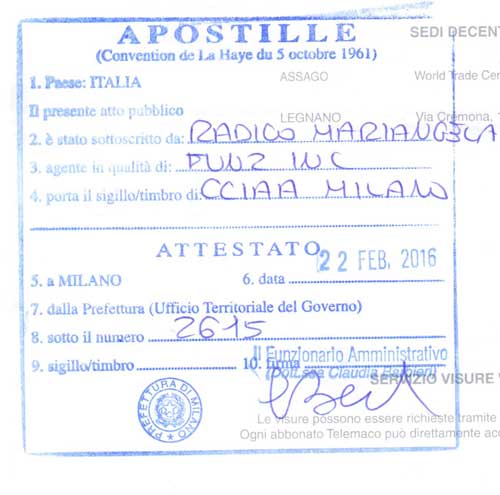
Schmidt & Schmidt covers the full spectrum of legalization services for documents issued in Italy.
Italy joined the Hague Convention on the Simplified Authentication of Documents on 13 December 1977; the Convention entered into force on 11 February 1978.
The apostille, or the “Hague apostille” is a certificate that authenticates the origin of a public document (e.g., a birth, marriage or death certificate, a judgment, an extract of a register or a notarial attestation). It confirms the authenticity of the signature and the authority of an official who signed the public document.
Documents issued in Italy are certified with an apostille in accordance with the Hague Convention of 1961 are recognized in all Member States of the Hague Convention and do not require any other form of certification, such as consular legalization, which considerably reduces the costs and time required for the certification of documents. So far, more than 120 states have joined the Convention.
The apostille is not sufficient for use in the states that are not party to the Hague Convention. In this case, consular legalization applies to a public document.
Designated Competent Apostille Authorities in Italy
For the countries that are members of The Hague Convention of October 5, 1961, there is an alternative procedure to the process of legalizing foreign public documents through an "apostille". In Italy, there are a few designated competent authorities from where you can obtain an apostille for your official documents. Apostillizing is applicable to documents issued by or to be validated in one of the member countries - these documents can be affixed with the Apostille stamp.
Individuals from these countries no longer need consular office visits for legalization but can instead approach the competent national authority designated by each State, usually the Ministry for Foreign Affairs, to obtain an apostille. This apostille ensures the document's validity and recognition in Italy.
The issuing of apostilles in Italy is handled by the following authorities:
- The public prosecutor at the courts in the jurisdiction where the documents were issued: this applies to judicial documents, civil status documents, and notarial acts.
- The prefect with territorial jurisdiction, the President of the Region for Valle d'Aosta, and the Government Commissioner for the provinces of Trente and Bolzano: this applies to all other administrative documents covered by the Convention.
The Public Prosecutor's Office at the Courts handles the legalization process for acts signed by Notaries or Chancellor's Office Functionaries.
On the other hand, the Prefectures are responsible for legalizing documents signed by other Italian Authorities, including Registry Office Functionaries or educational institutions.
The apostille in Italy is a square stamp in Italian with the obligatory heading "Apostille" and a reference to the 1961 Hague Convention in French (Convention de La Haye du 5 octobre 1961). The apostille certificate’s sides will be at least 9 centimeters long.
Types of documents

| Can be apostillized | Cannot be apostillized |
|---|---|
|
|
Specific aspects and document requirements for the apostille in Italy
Italy is among the 120 countries that recognize and issue apostilles in accordance with the Hague Convention of 5 October 1961. The apostille serves as a confirmation of the official status of a document.
Document Requirements for Apostille in Italy
Since 2006, Italy is a part of the electronic Apostille Programme (e-APP) which means it supports the electronic issuance and verification of Apostilles around the World.
Additionally, according to the Apostille Convention, Apostilles must be assigned consecutive numbers, with each issued Apostille having its own unique number. An Apostille includes a seal and 10 essential details, which are as follows:
- Name of the country issuing the document
- Name of the person who signed the document
- Capacity in which the signer acted
- Name of the authority that affixed the seal or stamp (for unsigned documents)
- Place of certification
- Date of certification
- Issuing authority
- Certificate number
- Seal or stamp of the issuing authority
- Signature of the issuing authority
Keep in mind that obtaining an apostille may take considerable time, so it's advisable to prepare well in advance if you need to legalize documents with an apostille for use in a foreign country.
Legalization of Italian educational documents for use abroad
For educational documents issued in Italian, such as school reports, university degree certificates, transcripts of records, enrollment certificates, and other school or university certificates, to be recognized and valid abroad, they must undergo a certification process through legalization.
Depending on the destination country and specific requirements, various types of legalization may be necessary for Italian documents.
You will most likely need to choose from one of the followig:
- Sworn Translation: Translation of the document by a certified translator.
- Apostille: for more information on apostille, please refer to the sections above.
- Legalization: the specifics of the process depend on the agreements between Italy and the destination country.
The legalization procedures are in place to verify document's authenticity. Legalization comes into play after translating documents for foreign countries. It also involves validating the signature. In Italy, the Prefecture (Prefettura) is generally responsible for document legalization.
The Public Prosecutor's Office in the district where the notary or judicial office is located has jurisdiction over acts performed by notaries, judicial officials, and court clerks.
Applicants seeking document legalization in Italy have two options:
- Send the document via mail to the Prefecture, along with an empty envelope, stamped and self-addressed, for the return of the document;
- Make an appointment and personally visit the Prefecture to apply for legalization.
Recognition of the authenticity of public documents within the EU
The legalization of documents may not be necessary for acts and certificates issued by countries that have signed specific agreements. Below is a list of international agreements that provide exemptions from legalization requirements:
- Convention between Italy and San Marino (March 31, 1939): Italy, San Marino;
- Paris Convention (September 27, 1956): Austria, Belgium, Bosnia-Herzegovina, Croatia, France, Germany, Italy, Luxembourg, Macedonia, Montenegro, the Netherlands, Portugal, Serbia, Slovenia, Switzerland, and Turkey;
- Luxembourg Convention (September 27, 1957): Austria, Belgium, France, Germany, Italy, Luxembourg, the Netherlands, Portugal, Switzerland, and Turkey;
- Agreement between Italy and Switzerland (November 16, 1966): Italy, Switzerland;
- London Convention (June 7, 1968): Austria, Belgium, Cyprus, Estonia, France, Germany, Great Britain (including Isle of Man), Greece, Ireland, Italy, Liechtenstein, Luxembourg, Malta, Moldova, Norway, the Netherlands (including Netherlands Antilles, Aruba), Poland, Portugal, Czech Republic, Romania, Spain, Italy, Switzerland, and Turkey;
- Convention between Italy and Germany (June 7, 1969): Italy, Germany;
- Athens Convention (September 15, 1977): Austria, France, Greece, Italy, Luxembourg, the Netherlands, Poland, Portugal, Spain, and Turkey;
- Munich Convention (September 5, 1980): Austria, Germany, Greece, Italy, Luxembourg, Moldova, the Netherlands, Portugal, Spain, Switzerland, and Turkey;
- Agreement between Italy and Spain (October 10, 1983): Italy, Spain;
- Brussels Convention (May 25, 1987): Belgium, Denmark (except Greenland and Fær Øer Islands), Estonia, France, Ireland, Italy, and Latvia;
- Agreement between Italy and Argentina (December 9, 1987): Italy, Argentina;
- Agreement between Italy and Austria (March 29, 1990): Italy, Austria;
- Agreement between Italy and Hungary (May 26, 1977): Italy, Hungary.
Contracting states of the Vienna CIEC Convention of 08.09.1976 (issuance of multilingual extracts from civil status registers: birth, marriage, and death certificate) are:
- Austria, Germany, Bosnia-Herzegovina, Bulgaria, Estonia, France, Italy, Cape Verde, Cyprus, Lithuania, Luxembourg, Macedonia, Moldova, Montenegro, Netherlands, Poland, Portugal, Romania, Switzerland, Serbia, Slovenia, Spain, Turkey.
Regulation on public documents (EU) 2016/1191 of 6 July 2016
Furthermore, Regulation (EU) 2016/1191 of 6 July 2016 on public documents simplifies the circulation of certain public documents that must be presented in an EU Member State and have been issued in another EU Member State, thus exempting public documents from the confirmation of authenticity with the Apostille with the aim of reducing administrative burden and costs for citizens.
Consular legalization of Italian documents for use abroad
Consular legalization is the process of authenticating or certifying a legal document so a foreign country's legal system will recognize it as with full legal effect that is carried out by the diplomatic or consular mission of the country in which the document is to be used.
To legalize foreign documents for use in Italy, individuals must apply at an Italian diplomatic representative or consulate in their home country. This process, known as consular legalization, is required when there are no International Conventions in force. In such cases, applicants rely on the assistance of Diplomatic Institutions.
However, if applicable, certain International Conventions can exempt individuals from the entire legalization process when the countries involved are part of specific agreements. The Conventions that eliminate the need for legalization include:
- Convention on the Free Issue and Dispensation from Legalization of Civil Status Records
- Convention Concerning the Abolition of the Legalization of Foreign Public Documents
- European Convention
- Convention on the dispensation from legalization for certain acts and documents
- Convention on the Abolition of the Legalization of Documents in the Member States of the European Communities
In general, consular legalization is more complex, time-consuming and costly than the simpler apostille procedure. Whereas apostille is usually issued within one step, consular legalization requires several pre-certifications before a public document can be certified at the embassy or consulate of the destination country.
It is a common requirement that the document has to be translated into the official language of the destination country before submission to the embassy. It is up to the diplomatic mission to decide about the authentication procedure.
The main differences between an apostille and consular legalization of documents
The common feature between apostille and consular legalization is that they authenticate an official document for presentation to institutions in another country. However, they have many differences.
| Apostille | Consular legalization | |
|---|---|---|
| Legal effect | Can be used in all countries that are party to the Hague Convention on the Simplified Legalization of Documents. | Use between States one or both of which is not a member of the Hague Convention, or where one of the contracting States has protested the accession of the other. |
| Difficulty | Moderate. To obtain an apostille, contact the competent apostille authority of the state of origin of the document. | High. For consular legalization, various inland authorities and a diplomatic mission of the state of destination must be involved. |
| Pre-certification | Usually not required. | Is obligatory. |
| Attestation at the state of destination embassy in the state of origin of the document | No need to contact the Consulate of the country of destination. | Is the final step of legalization. |
Apostille and consular legalization in all cities of Italy
Schmidt & Schmidt provides apostille and consular legalization services for public documents originating from all regions across Italy. We handle the entire process, from document review to obtaining the necessary certifications, ensuring that your documents are valid and recognized internationally. With our reliable services, you can confidently use your Italian public documents abroad.
Procurement of documents from Italy
If the important documents are lost or damaged, or current copies of the documents are needed, the re-issue of the documents is required. It is not unusual for people outside Italy to encounter difficulties with obtaining new documents when abroad. Our consultants will help you procure new documents from Italy remotely, and we can arrange for your documents to be sent by courier anywhere in the world.
Certified translation of documents from Italy
Copies and transcripts of civil status documents can be translated into any language by a sworn translator in Italy or the translation can be done in the country of destination. We offer certified translations of civil status documents with further certification. The cost of the work is calculated according to the volume of the document in question.
Does the translation have to be apostillized?
Any foreign document issued in one country and used in another country must be legalized for use abroad. Therefore, the authenticity of a certified translation from Italy needs to be certified by an apostille. Consequently, many authorities may not accept certified translations from Italy if the translation has not been properly authenticated in Italy for use abroad. To avoid this confusion, translations should better be made in the state of the destination of the document.

























































